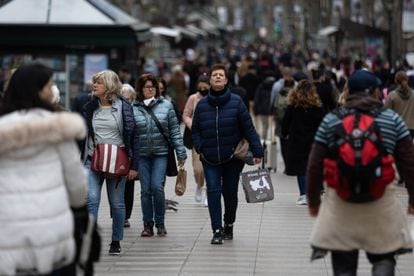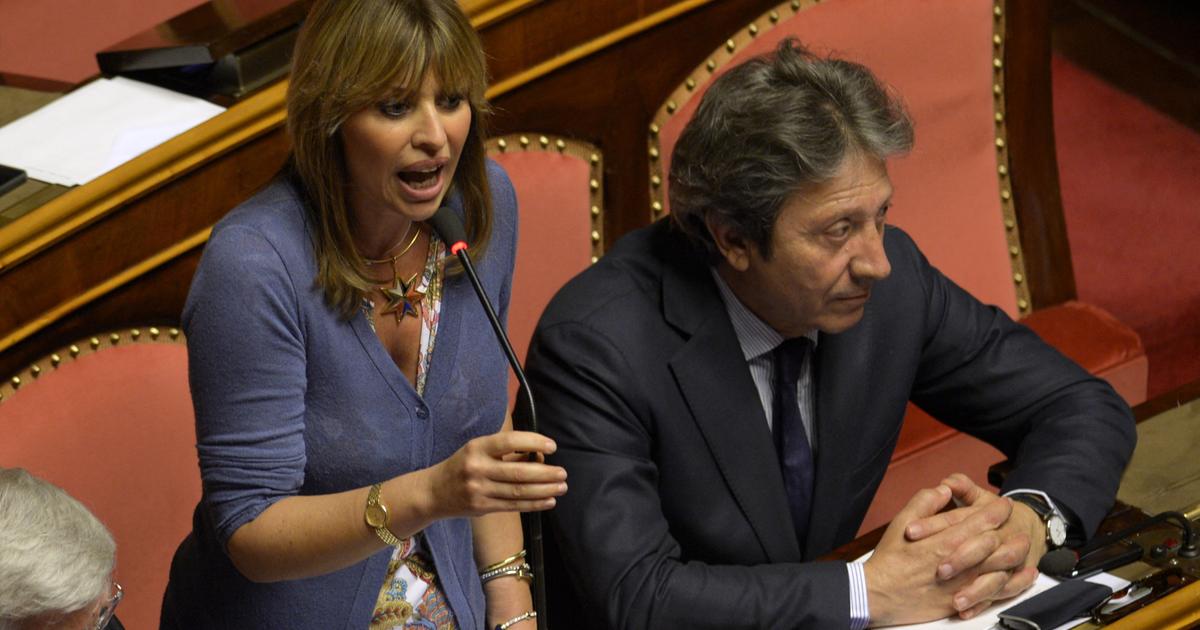This is not what it was.
The mask, which has accompanied and protected us for two years, is becoming optional depending on the place and time.
Unlike other European countries, in Spain it is compulsory indoors.
But things relax.
Do you want to stay in the cinema with your face uncovered?
Well, buy some popcorn, chew some from time to time and that's it.
A walk through Madrid and Barcelona allows us to verify that, after the omicron scare, we are gradually moving away from the routines of the pandemic.
Some still prefer facial protection.
Two women who travel on the Madrid metro talk about whether it will continue to be compulsory for a long time.
"If they remove it, let it be after Easter, that people on vacation are happy and then we have another wave," she says.
"I've gotten used to it," says the other, wearing a brand new white FFP2.
And her children?
"They don't care, as soon as they can they lose it," sighs the first.
In a shop on Barcelona's Rambla de Catalunya, a saleswoman sees advantages: "It's comfortable to go with your face covered because you don't have to smile at the customers," she says.
Passers-by on the Rambla in Barcelona, last Friday.
Albert Garcia (THE COUNTRY)
In general, the later the hour and the younger the staff, the fewer masks.
Take Calle Ponzano in Madrid as an example, with an extraordinary concentration of bars and restaurants: after midnight, it is easy to forget that there was, and is, a pandemic.
“In the beginning, in 2020, the clientele took many precautions and whoever moved around the premises without a mask was recriminated;
now it is different”, explains the owner of a cocktail bar near Ópera, in Madrid.
"I myself attend without a mask," he adds.
"And I only wear it if, for example, I have to serve drinks on a sofa where customers carry it."
"We are very tired," acknowledges Dr. Antonio Zapatero, deputy minister for Health Care and head of the Madrid Health Service.
“We've been at this for two years and every time it seemed to end, a new wave has come,” he says.
“So, in addition to fatigue, a certain mistrust remains.
But I think that the pressure drops and that it is convenient to gradually remove the masks.
Its use indoors should no longer be compulsory, except in hospitals, public transport and nursing homes.
Also Dr. Josep María Argimon, Minister of Health of the Catalan government, believes that the time has come to return to normality.
“We have to put an end to the mask;
if things got worse again, we would backtrack,” he declares.
Both Zapatero and Argimon agree in pointing to the summer of 2021 as a key moment of collective fatigue and as the beginning of "the dissociation between the behavior of people and the task of professionals", in the words of the Catalan minister.
Citizens attacked that summer with great enthusiasm.
End-of-year trips, music festivals, massive dinners are back.
After the summer came the fifth wave.
It was a moral blow for everyone, especially for the toilets.
The fear of the omicron variant
The last phase of maximum precaution was registered in the middle of last December.
The owner of the cocktail bar in Ópera, a waiter from a restaurant near Barcelona's Diagonal and those responsible for public health say so.
"People did not want to get infected before Christmas, they wanted to celebrate the family holidays and they feared the new variant of the virus, omicron, which they said was more dangerous than all the previous ones," explains the waiter.
On December 23, the mask became mandatory on the street again.
The fact, verified later, that ómicron infected many but seriously harmed few contributed to the relaxation from the end of January.
In February, the Spanish government again abolished the obligation to wear a mask outdoors.
For many, that twist had been excessive.
Dr. Zapatero agrees with those who were skeptical about the usefulness of the mask outdoors and considers the long ban on outdoor activities "absurd".
He clarifies, however, that from the beginning of the pandemic, health officials had to resort to "the trial and error system" because "the situation was unknown."
"One and the other we were wrong in this or that, but I consider that things have been done well, as far as possible, and that we should feel proud of the general behavior of citizens," he adds.
The Madrid Deputy Minister acknowledges that in the current situation there are absurd situations: “I enter the restaurant with a mask, I walk two meters to the table and, once there, I take it off throughout the meal.
Dont have much sense.
The other night I went to the cinema.
I was wearing a mask, but around me others were eating and drinking quietly and they did not put on the mask at any time.
Back to normal
No less paradoxical are some situations in public transport.
On the AVE between Madrid and Barcelona, for example.
Anyone who wants to see what a crowded, unventilated space is like, with groups of people talking almost loudly and completely oblivious to the use of masks, just has to go to the cafeteria car.
Only employees wear a face covering.
"There comes a point where we don't care a bit, right?" Justifies a traveler in a suit with a soft drink in hand.
"And it's worse if you drink something on the seat, because the neighbor can look at you badly or tell you off."
Neither in the Scandinavian countries nor in the United Kingdom is the mask mandatory, with the exception of very specific situations.
In France it is no longer compulsory next week.
The Spanish government prefers to wait, despite the fact that most of the autonomous communities consider that the time has come.
"I hope this ends soon, because carrying boxes is more tiring with a mask and I spend the day panting," complains the stocker of a Mercadona near Galapagar.
In Catalonia, the restrictions were more severe and prolonged than in Madrid.
Now, the revelry and carefreeness are similar in the bar of a bar in Madrid or Barcelona.
"It's curious, but the most cautious are usually foreigners, many of them show me their covid passport before asking for a drink," says the manager of a central bar in Madrid.
"This has been very hard," concludes the deputy minister from Madrid.
“The time has come to return to normal life since only those who want to wear a mask.
It also seems to me that the time has come, ”he adds.
"To evaluate what we have done, the mistakes and the successes, because we health officials have had too many fights with each other and it would be good to have common standards of action for what may happen in the future."
Madrid and Catalonia, the regions most affected by covid-19
BERTA FERRERO
Madrid and Catalonia continue to lead as the regions most affected by the coronavirus.
Last Friday, the number of confirmed cases of the Coronavirus in Spain exceeded 11.2 million.
According to data from the Ministry of Health, which collects those from the Autonomous Communities, Catalonia stands out right now by already exceeding 2.3 million confirmed infected cases and Madrid lags behind with 1.6, a difference that has skyrocketed especially in the sixth wave, which has made a dent especially in Catalan lands.
In total, since the pandemic began, a total of 101,135 deaths have been registered due to COVID-19 in the country, 18,528 in Catalonia and 17,567 in Madrid, where the lethality is somewhat higher (1.1% compared to 0). .8%).
The ómicrom variant, the one that has spread more quickly in the sixth wave,
In fact, at the height of the first wave, in May 2020, Spain had more than 26,000 deaths, with Madrid at the top of the table, with 8,600, well above the 5,500 of Catalonia, the second region. in which more deaths were recorded at that time.
The first suspected cases were officially announced by the World Health Organization on December 31, 2019 after the appearance of this new coronavirus about three weeks earlier in one of the markets in the Chinese region of Wuhan, from where it acquired its name.
For its part, in Spain the first affected by the covid was a German tourist in La Gomera, and his case was confirmed at the end of January 2020.
Subscribe here
to our daily newsletter about Madrid.
Exclusive content for subscribers
read without limits
subscribe
I'm already a subscriber




/cloudfront-eu-central-1.images.arcpublishing.com/prisa/GSAG3AFDE5GZ7CR5RU42LT63UM.jpg)







